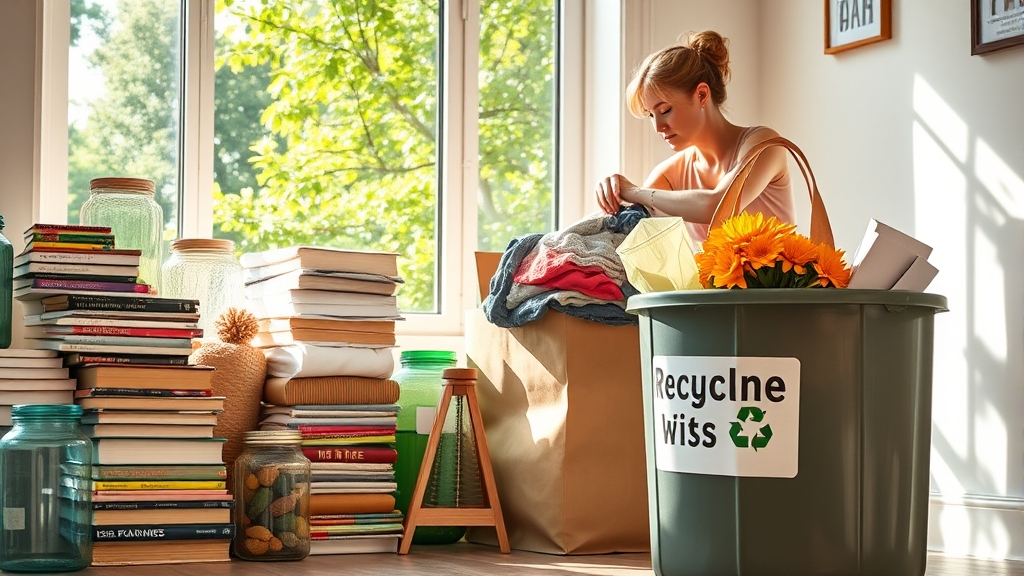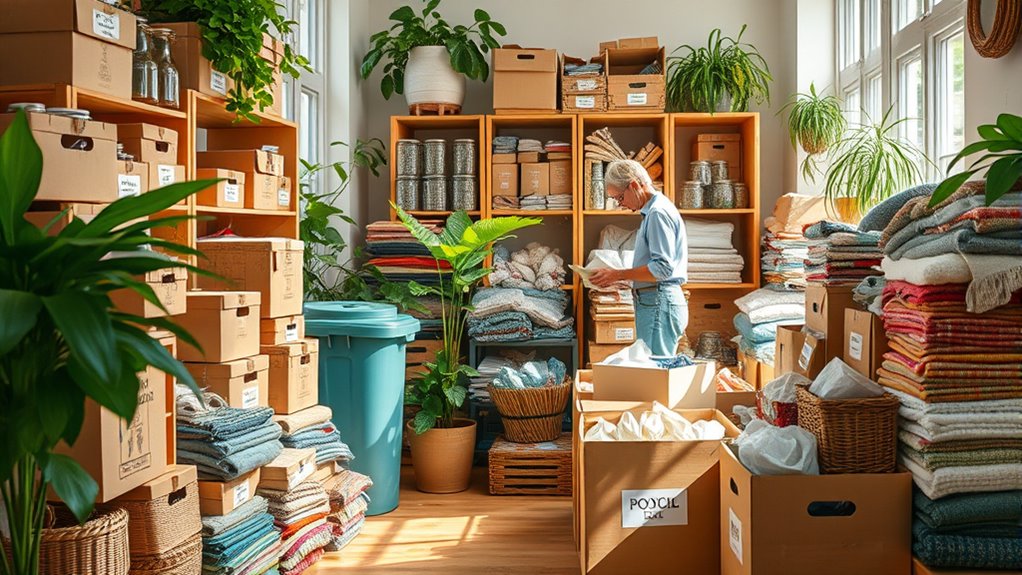To declutter sustainably, focus on donating items you no longer need to charity, reusing what you can through creative upcycling, and recycling properly by following local guidelines for electronics, plastics, and metals. This approach minimizes waste, reduces environmental impact, and supports resource conservation. Adopt responsible disposal habits as part of a minimalist mindset, and make small, mindful choices regularly. If you stay engaged, you’ll discover effective ways to keep your space clutter-free and eco-friendly.
Key Takeaways
- Prioritize donating items in good condition to charities or community organizations instead of throwing them away.
- Reuse and upcycle everyday objects, like jars or clothing, to extend their lifespan and reduce waste.
- Follow local recycling guidelines for electronics, plastics, and metals to ensure proper disposal and resource recovery.
- Regularly assess possessions, discarding only what is truly unnecessary, to promote minimalist and sustainable decluttering.
- Incorporate eco-friendly disposal practices into your routine to minimize environmental impact and support a circular economy.

Have you ever wondered how to declutter your space without harming the environment? The key lies in adopting an eco-friendly disposal approach and embracing a minimalist mindset. When you let go of unnecessary items, it’s tempting to toss everything into the trash, but that’s not the sustainable way to declutter. Instead, focus on reducing waste by carefully considering how each item can be reused, donated, or recycled. Developing a minimalist mindset helps you prioritize what truly adds value to your life, making it easier to determine what to keep and what to let go. This mindset encourages you to see possessions as resources rather than clutter, which naturally leads to more mindful disposal habits.
Embrace minimalism and eco-friendly disposal to declutter responsibly and protect the environment.
Start by sorting your items into categories: keep, donate, recycle, or dispose of responsibly. For the things you no longer need, think about eco friendly disposal options. Donating clothes, books, and household items to charities or community centers extends their life and reduces landfill waste. Reusing items whenever possible is another powerful way to be environmentally conscious. For example, repurpose jars as storage containers or turn old t-shirts into cleaning rags. These small acts of reuse keep items out of the trash and lessen your ecological footprint. Additionally, upcycling techniques can transform items into new, useful products, further reducing waste. Incorporating creative reuse can inspire you to see everyday objects in a new light and find innovative ways to repurpose them. Understanding product lifecycle helps you make more sustainable choices about what to keep and what to let go, considering the entire lifespan of an item from production to disposal. Recognizing the environmental impact of waste disposal methods encourages more responsible decision-making when decluttering.
Recycling is equally important, especially for electronics, plastics, and metals. Make sure to follow local recycling guidelines carefully to ensure these materials are processed correctly. Proper recycling prevents hazardous waste from polluting the environment and reduces the need for new raw materials. By adopting a minimalist mindset, you also avoid the trap of accumulating more than you need. This approach not only simplifies your space but also minimizes the environmental impact of manufacturing, packaging, and shipping new products. Decluttering becomes an opportunity to reflect on what truly matters, making eco friendly disposal easier because you’re intentional about what you let go of. As you declutter, ask yourself if each item has served its purpose and if it can still be useful to someone else. When you do this regularly, you’ll find it becomes second nature to dispose of items responsibly, knowing you’re contributing to a healthier planet. Additionally, understanding the importance of sustainable disposal practices can help reinforce your commitment to eco-friendly decluttering.
In essence, decluttering sustainably isn’t just about tidying up your space; it’s about changing your mindset and habits. When you think in terms of eco friendly disposal and minimalism, your decluttering efforts become a positive action for the environment. It’s a way to create a cleaner, more organized space while respecting the planet’s resources. Over time, these small choices add up, helping you live more intentionally and sustainably.
Frequently Asked Questions
How Can I Identify Truly Eco-Friendly Donation Centers?
To identify truly eco-friendly donation centers, you should look for eco-friendly certifications like Green America or Earthwise. Check donation center reviews online to see if they follow sustainable practices. Visit their websites or contact them directly to ask about their recycling and reuse policies. Trust centers that are transparent about their environmental efforts and hold recognized certifications, ensuring your donations support eco-conscious initiatives.
What Items Are Most Difficult to Recycle Properly?
Ever wonder why some items seem to resist the recycling bin’s embrace? Plastic contamination and electronic waste are the trickiest to handle. Plastics with mixed materials or labels often contaminate recycling streams, while electronic waste requires special disposal. You might think you’re doing good, but improper recycling can cause more harm than good. To truly help, learn how to sort and dispose of these items responsibly, ensuring they’re recycled properly or reused when possible.
How Can I Ensure My Reused Items Are Safely Sanitized?
To guarantee your reused items are safely sanitized, start with DIY sanitization by thoroughly cleaning with soap and water. For added safety, consider disinfecting with a solution like diluted bleach or alcohol-based wipes, following safety precautions such as wearing gloves and ensuring proper ventilation. Always check item labels for specific cleaning instructions, and let items dry completely before reuse to prevent any bacterial or mold growth.
Are There Specific Brands That Support Sustainable Decluttering?
You might wonder if specific brands support sustainable decluttering. Look for eco-conscious labels and brand partnerships focused on environmental responsibility. These brands often prioritize eco-friendly materials, ethical practices, and recycling initiatives. By choosing these brands, you support sustainability efforts. Always check their commitments and certifications to make sure they align with your decluttering goals, helping you make more eco-conscious choices while reducing waste and supporting ethical brands.
What Are Innovative Ways to Upcycle Old Clothing and Furniture?
Imagine your old clothing and furniture as blank canvases waiting for a new story. To achieve fashion innovation and furniture transformation, you can craft patchwork garments or turn worn-out chairs into statement pieces with paint and fabric. Upcycling isn’t just creative; it’s eco-friendly. Use sewing, dyeing, or woodworking techniques to breathe new life into your items, making them unique while reducing waste and showcasing your personal style.
Conclusion
By decluttering sustainably, you not only free up space but also protect the environment. Imagine donating your old clothes to a local charity, knowing they’ll find new life elsewhere, or recycling electronics responsibly to prevent e-waste. For instance, Sarah donated her furniture to a community center, reducing waste and supporting others. Small actions like these make a big difference, helping you create a clutter-free space while contributing to a greener planet.








